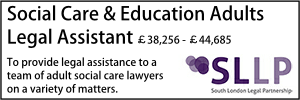Improper Local Authority Designated Officer referral impacted vetting of police officer, Ombudsman finds
- Details
A Buckinghamshire Council social worker has been found at fault after she made an improper Local Authority Designated Officer (LADO) referral which caused difficulties for a foster parent who was also a police officer, an investigation by the Local Government and Social Care Ombudsman has found.
The foster parent, referred to in the Ombudsman's report as 'Mr X', said that the improper referral might have an adverse impact on vetting for his job and had caused him distress and inconvenience.
LADOs are responsible for investigating allegations against people in positions of trust working with children in the local authority's area. These allegations can be made when someone may have harmed a child, committed an offence against a child, or behaved towards a child, or children, in a way that indicates they may pose a risk of harm to children.
Mr X and his wife fostered a child, Y, and were concerned about her use of social media. They informed the council of an incident in which the child had shared photographs of a sexual nature with a boy.
A meeting was held at the council in which it was decided an investigation needed to take place under its duties laid out in Section 47 of the Children Act 1980.
A council social worker received the minutes from the meeting and claimed that they consequently called the Buckinghamshire LADO for advice as she was unsure if the threshold was met for a LADO referral.
The social worker told the Ombudsman that the Buckinghamshire LADO then directed her to make a referral to a different LADO, who was out of their area, and that it could not provide advice. However, the Buckinghamshire LADO later advised the Ombudsman it had no records of a call from the social worker.
The council met with Mr X and Mrs Y as part of the Section 47 enquiries. The local authority noted that Y gets "love and attention from her foster carers" and raised no concerns about either Mr X or Mrs X.
Two days later the social worker made the referral to the out of area LADO, noting that Mr X was a police officer. She detailed concerns about the child sending explicit pictures. The referral did not raise any concerns about either parent.
When Mr X found out about the referral, he immediately complained to the council. A few days later, the out of area LADO confirmed it had reviewed the referral and would not be taking any action. Buckinghamshire subsequently confirmed this with Mr X and said it would not formally record any allegations against Mr or Mrs X on its system.
Two months later, Mr X made a further complaint as the LADO referral was now flagged when he was getting vetting for his work. He also said that by making the LADO referral, the social worker was implying he was the person presenting potential harm to Y.
He asked for the referral to be removed from partner agencies and that the council delete any record of the referral.
Liaising with Mr X, the social worker's manager told him she was on annual leave on the day the social worker made the LADO referral. The manager said she would have told her not to make it because "there was no reason to involve LADO as there was no suggestion that any person in a position of trust had acted in a way that had harmed children".
The council added that the out of area LADO had recorded the referral on its system but noted it as not meeting the threshold and had not shared this information.
Mr X complained about the council sharing false information through the LADO referral. He said he had concerns about the out of area LADO sharing the information from the referral. Mr X asked that all agencies removed any details about the LADO referral under his rights to erasure of data under the Data Protection Act.
However, the council advised, following consultation with the data protection officer, that it had not broken data protection regulations. It also said it could not delete the referral.
Mr X then told Buckinghamshire he had referred the issue to the Information Commissioner's Office (ICO). But the local authority again, after passing the matter to a data protection officer, upheld its decision not to erase the information because it claimed it shared the information for a valid purpose, excluding it from the right of erasure.
Considering the events, the Ombudsman found that the social worker was at fault for completing the LADO referral and that this was "an improper use of the LADO referral process".
The LADO referral form says that social workers should consult with the local authority's LADO before making a LADO referral. However, the Ombudsman's investigation found that the social worker, in this case, did not consult with Buckinghamshire's LADO before completing the referral, despite what they claimed. The social worker also did not consult with the out of area LADO, according to the Ombudsman.
The Ombudsman found the social worker’s failure to follow the referral process, by failing to consult, and improper use of the referral process was fault.
The Ombudsman said: "The Council has already recognised this fault, provided feedback to [the social worker] and improved its guidance material on referrals to the LADO. The improved guidance materials highlight the importance of consultation with the LADO as the first step as part of a LADO referral. I am satisfied the council has already made suitable service improvements to address the issues in Mr X's complaint."
The report added: "While the Council has improved its service following Mr X's complaint, Mr X experienced a personal injustice because of the improper referral. Mr X has experienced distress and frustration by referral to the LADO, implying an allegation against him.
"The Buckinghamshire LADO may not hold any information about the referral about Mr X but the out of area LADO has kept information. This has caused Mr X professional difficulties with vetting."
The Ombudsman said it could not require any council to remove data it holds, this was a matter for the Information Commissioners Office.
However, the Ombudsman recommended that Buckinghamshire apologise to Mr X for the improper use of the referral process and for the distress and frustration this had caused him. The council should also write a letter to Mr X confirming its social worker should not have completed a referral to the LADO about Mr X.
Anita Cranmer, the local authority's Cabinet Member for Children’s Services, said: “Buckinghamshire Council fully accepts the finding of the Ombudsman and we are sorry for the stress and upset this has caused to the parties involved. We undertake to improve our systems and procedures to ensure that similar incidents do not happen in the future. Our aim is always to put the safety of the child at the forefront of everything we do and we continue to work with families and professionals to ensure that this remains our number one priority.”
Adam Carey





















































